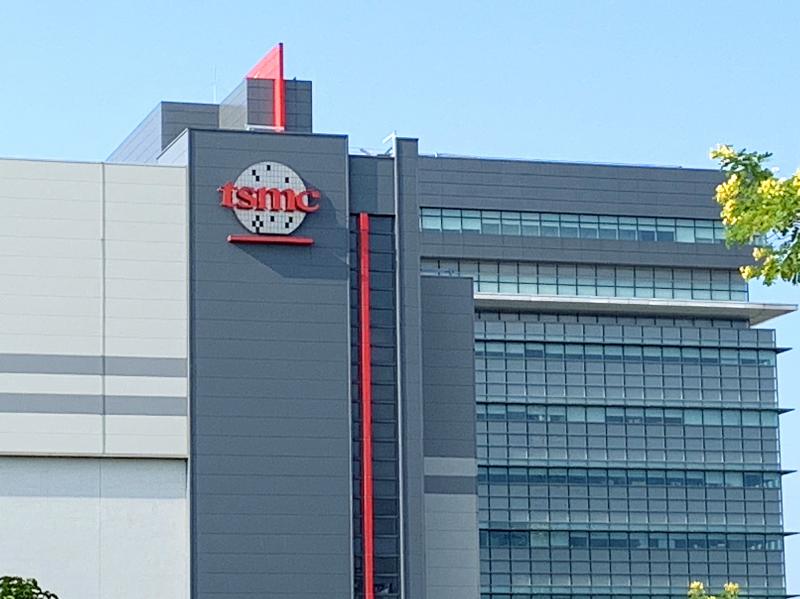Taiwan Semiconductor Manufacturing Co (TSMC, 台積電) is reportedly planning to tighten customers’ payment terms next year to better manage its cash flow and fund its capital spending.
The Hsinchu-based chipmaker plans to ask customers to pay within 15 days of receiving chips from TSMC, compared with its current practice of 30 days, the Chinese-language Liberty Times (the Taipei Times’ sister newspaper) reported yesterday, citing sources from firms in semiconductor supply chains.
The new payment terms are to take effect next year, the newspaper said.

Photo: Grace Hung, Taipei Times
TSMC counts Apple Inc, Advanced Micro Devices Inc, Nvidia Corp and MediaTek Inc (聯發科) among its major customers.
To capture rapidly growing demand, TSMC might spend more than US$40 billion on capital expenditure next year, following a record budget of US$40 billion to US$44 billion this year, company chairman Mark Liu (劉德音) told shareholders in Hsinchu last week.
Such huge capital spending is reducing the chipmaker’s free cash flow, Liu said.
The massive investment is aimed at boosting revenue growth in the next few years, as TSMC expects it to accelerate to an annual rate of 30 percent this year, up from 24.9 percent last year, Liu said.
In the first quarter, TSMC saw its free cash flow fall 22.85 percent to NT$110.04 billion (US$3.7 billion), compared with NT$142.64 billion a quarter earlier, the firm said in a financial statement.
That is the lowest figure in about three quarters.
TSMC also told customers that it planned to increase prices on new orders by 10 percent next year, the Liberty Times said.
The chipmaker has reportedly raised chip prices several times due to surges in manufacturing costs and a prolonged chip crunch.
TSMC said in an e-mail to the Taipei Times that it does “not comment on such questions.”

POWERING UP: PSUs for AI servers made up about 50% of Delta’s total server PSU revenue during the first three quarters of last year, the company said Power supply and electronic components maker Delta Electronics Inc (台達電) reported record-high revenue of NT$161.61 billion (US$5.11 billion) for last quarter and said it remains positive about this quarter. Last quarter’s figure was up 7.6 percent from the previous quarter and 41.51 percent higher than a year earlier, and largely in line with Yuanta Securities Investment Consulting Co’s (元大投顧) forecast of NT$160 billion. Delta’s annual revenue last year rose 31.76 percent year-on-year to NT$554.89 billion, also a record high for the company. Its strong performance reflected continued demand for high-performance power solutions and advanced liquid-cooling products used in artificial intelligence (AI) data centers,

SIZE MATTERS: TSMC started phasing out 8-inch wafer production last year, while Samsung is more aggressively retiring 8-inch capacity, TrendForce said Chipmakers are expected to raise prices of 8-inch wafers by up to 20 percent this year on concern over supply constraints as major contract chipmakers Taiwan Semiconductor Manufacturing Co (TSMC, 台積電) and Samsung Electronics Co gradually retire less advanced wafer capacity, TrendForce Corp (集邦科技) said yesterday. It is the first significant across-the-board price hike since a global semiconductor correction in 2023, the Taipei-based market researcher said in a report. Global 8-inch wafer capacity slid 0.3 percent year-on-year last year, although 8-inch wafer prices still hovered at relatively stable levels throughout the year, TrendForce said. The downward trend is expected to continue this year,

Vincent Wei led fellow Singaporean farmers around an empty Malaysian plot, laying out plans for a greenhouse and rows of leafy vegetables. What he pitched was not just space for crops, but a lifeline for growers struggling to make ends meet in a city-state with high prices and little vacant land. The future agriculture hub is part of a joint special economic zone launched last year by the two neighbors, expected to cost US$123 million and produce 10,000 tonnes of fresh produce annually. It is attracting Singaporean farmers with promises of cheaper land, labor and energy just over the border.

US actor Matthew McConaughey has filed recordings of his image and voice with US patent authorities to protect them from unauthorized usage by artificial intelligence (AI) platforms, a representative said earlier this week. Several video clips and audio recordings were registered by the commercial arm of the Just Keep Livin’ Foundation, a non-profit created by the Oscar-winning actor and his wife, Camila, according to the US Patent and Trademark Office database. Many artists are increasingly concerned about the uncontrolled use of their image via generative AI since the rollout of ChatGPT and other AI-powered tools. Several US states have adopted